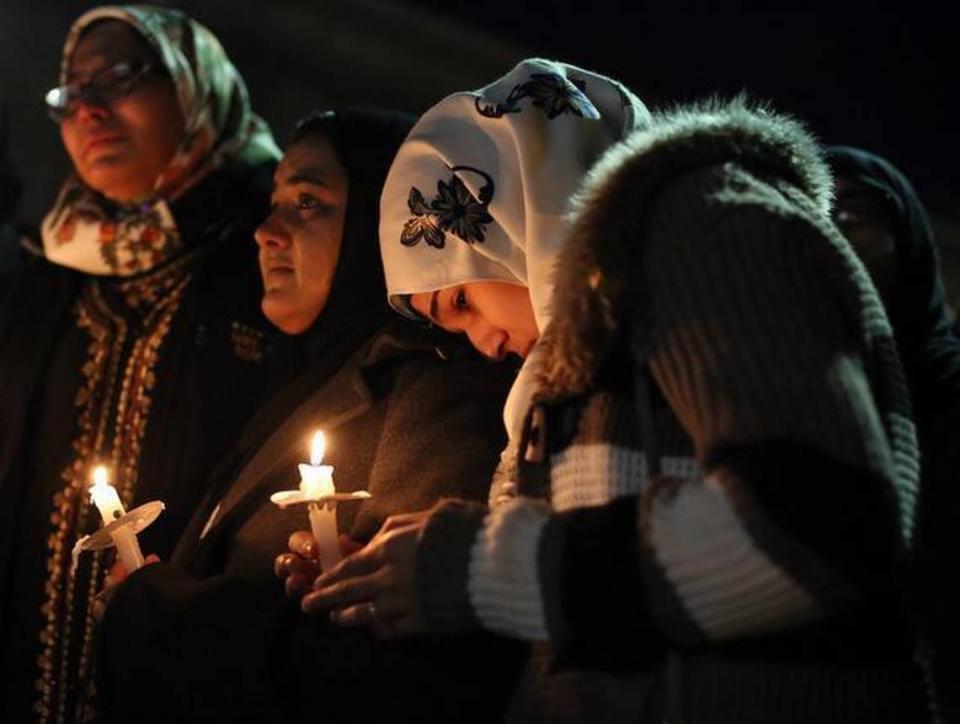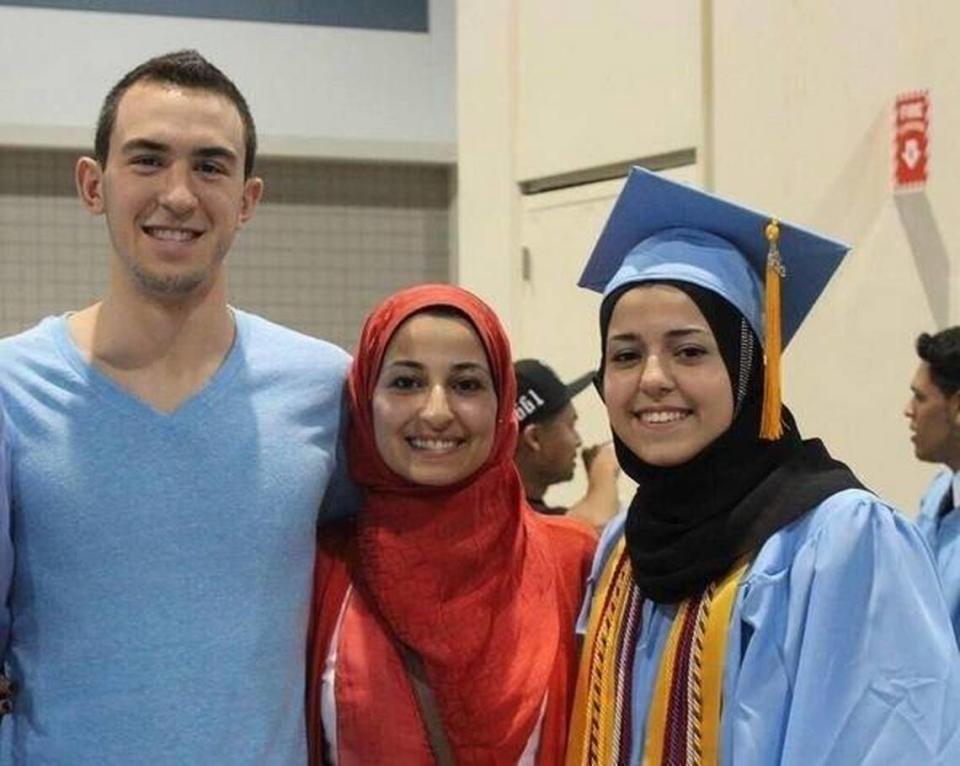New film documents Chapel Hill’s Muslim murders, dangers of anti-Arab hate in America
Thirty-six seconds — that’s how quickly a Chapel Hill man murdered three Muslim students in 2015, shattering their families’ lives and enraging millions of people around the world.
Deah Barakat, 23, and his 21-year-old wife, Yusor Abu-Salha, were newlyweds. He was a second-year dental student at UNC-Chapel Hill, and she was planning to attend graduate school that fall. Her sister, Razan Abu-Salha, 19, was an N.C. State University student.
They shared a desire to serve their community, their families have said, and were planning a mission trip to Turkey to bring dental care to Syrian refugees and a future dental clinic. Razan was an advocate for people experiencing homelessness.
On Feb. 10, 2015, the three were sitting down to dinner in the couple’s Finley Forest home in Chapel Hill when Craig Hicks knocked on the door. His threats and the executions that followed were captured on Barakat’s cell phone and played back during the 2019 trial.
While initially called a parking dispute, Hicks’ hatred for Islam and the couple soon surfaced, including previous encounters in which Hicks sometimes displayed a firearm.
A global community held vigils and protests, calling it a hate crime and terrorism, said filmmaker Tarek Albaba, a Palestinian-American from Charlotte, who documents their story in a new documentary film, “36 Seconds: Portrait of a Hate Crime.”
The families tried unsuccessfully to have Hicks charged with a felony hate crime; he is serving three life sentences for murder.
“36 Seconds” tells the story of trauma and hatred Muslims experience and why people reacted in anger when Hicks was arrested, said Albaba, 39. He wants viewers “to empathize with these family members, and to put yourself in their shoes.”
“We immediately knew these kids must have been targeted, this must have been a hate crime,” he said, praising the Barakat and Abu-Salha families for how they raised their children. He called them “superheroes” for quickly turning tragedy into activism.
“In a way, our community was lucky that that the victim’s families were so well educated, they’re so articulate They had this amazing grace, and they were able to in the face of this adversity and pain and trauma, were able to very clearly say who these kids were, what they represented, how they were raised, and why (this) should be prosecuted as a hate crime,” he said.
The families have seen the film but are focused on moving forward with their lives, he said.
Message for a time of bias, hate
Triangle residents have three opportunities this month to watch “36 Seconds” and hear from a panel of filmmakers and local leaders. The Light House Project and Our Three Winners Foundation, both formed in the aftermath of the murders, are co-hosting the events.
The groups recently announced a three-year partnership that will provide The Light House Project with more grant money and more support for the Our Three Winners program, DYOR Dental Clinic, which provides dental relief to people in need.
Albaba’s Full Disclosure Films debuted the documentary last year at the DOC NYC film festival in New York, where it got a $20,000 grant from the nonprofit group Subject Matter. The group also gave $15,000 to the Our Three Winners Foundation.
“36 Seconds” is not just a story about the murders, but also examines gun laws and the dangers of American Islamophobia, Albaba said. The film is headed to screenings nationwide, including the Santa Barbara International Film Festival. The hope is that Hulu or another major studio can share it with a wider audience, although documentaries are facing an uphill battle, he said.
What happened in Chapel Hill was not an isolated crime, said Nadia Khan, executive director of The Light House Project. which was established by Barakat’s family as a safe space for people to heal, be empowered and build their leadership skills.
“I think it’s nice to have something like this (documentary) to show our history, because it has been so long since the tragedy,” Khan said. “Our focus is primarily on building leaders through service, through community, through faith and that’s based off the legacy of the Three Winners.”

The film’s timing is especially relevant in light of fighting in Gaza, the 2024 election and a resurgence in anti-Arab and anti-Muslim hate in the United States, Albaba said. He noted a similar “groundswell of divisiveness and rhetoric” in 2015, when people called online for more Muslims to die.
“And now, it’s only worse,” Albaba said. “In the past couple of months, we’ve seen a 6-year-old get stabbed to death. We’ve seen three Palestinian students be shot at point-blank range. You’ve seen a father with his son at a playground in Brooklyn, New York, get harassed and punched, coffee thrown at them ... These are very serious hate crimes that are happening now.”
The community has an obligation to act, he said.
“Whether you’re witnessing hate crimes or hate speech online, on social media, in your classrooms, on your campuses, we can do more, we could stand up for people who are being victims of hate speech or abuse ... get it on record right away,” he said.
NC hate crimes law, conversation
Durham County District Attorney Satana Deberry, who was elected in 2018, agreed it is time for a conversation. Deberry prosecuted the case in 2019, forgoing the death penalty, in part, because she didn’t think a jury would be receptive and it’s not a fair punishment.
But she also was worried about future appeals and hearings that could affect the families, she said.
“This is the ninth anniversary of the deaths of Deah, Yusor and Razan, and their families won’t have to step back in a courtroom or have to see that evidence again or have to hear a judge go through the facts and the law and all of that stuff over and over and over again, so in that sense, this is as good an outcome as we could have,” Deberry said.
“On the other hand, it will remain tragic. They would be in their 30s now, they’d probably have children of their own. This loss is going to always be lingering, so we want to focus on the family and not what is happening to Craig Hicks at this point.”
North Carolina needs to address issues of bias and discrimination, and “accountability for how we treat people,” said Deberry, who is seeking the Democratic nomination in the N.C. Attorney General’s race. While arguments could be made for a felony hate crime law in North Carolina, the current General Assembly is not receptive, she said.
Nearly all states have hate crime laws, but protected classes and prosecution varies. North Carolina’s hate crime law is a misdemeanor with limits on who it protects. A bill creating the state’s first felony law — the Hate Crimes Prevention Act — has stalled since 2019.

Watch the film, get involved
▪Durham film screening: 7 p.m. Monday, Feb. 12, at the Carolina Theatre. Doors open at 6 p.m. Panel: Durham County Commissioners Chair Nida Allam, Democratic state Sen. Jay Chaudhuri, UNC Professor Joseph E. Kennedy, and Deberry. Tickets: $14.
▪Cary film screening: 6:30 p.m. Tuesday, Feb. 13, at the Cary Theater. Panel: Executive producer Omar Altalib, community member Doha Hindi, and Light House Project Chairman Ibraheem Khalifa. Doors open at 6 p.m. Tickets: $14.
▪Raleigh film screening: 6 p.m. Monday, Feb. 19 at the Witherspoon Student Center at N.C. State University. Tickets: Free, with priority for members of the NCSU community.
▪Charlotte film screening: 6:30 p.m. Saturday, Feb. 12, at the Sandra Levine Theatre at Queens University. Tickets: Free.
▪ 2024 Interfaith Food Drive: Donate online or drop off food through Feb. 24 at The Light House Project, 1127 Kildaire Farm Road, Cary, and the NCSU University Cashier’s Office, 2831 Thurman Drive, Raleigh. Volunteers are needed. Information: lhproj.com/fooddrive
▪ Day of Light Ceremony: 6:30 p.m. Feb. 10 at Curate Studio, 3651 Green Level West Road in Apex. Information: tinyurl.com/26sywj9z

